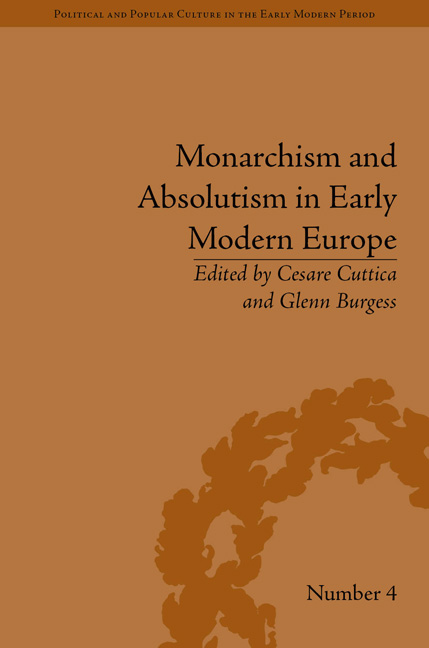Book contents
- Frontmatter
- CONTENTS
- Acknowledgements
- List of Contributors
- Introduction: Monarchism and Absolutism in Early Modern Europe
- Part I Royalists, Republicans, Patriarchalists: English Thinkers at Odds in the Seventeenth Century
- Part II Absolutism, Cynicism, Patriotism: Eighteenth-Century Enlightenment Reflections
- Part III Absolutism, Monarchism, Despotism in Theory and Practice: Contested Historiography and Comparative Approach
- Part IV Monarchy, the State of Nature, Religion and Iconography in European Perspective
- 11 ‘Monstrous’ Pufendorf: Sovereignty and System in the Dissertations
- 12 Absolute Chaos, Absolute Order: The Rhetoric of the State of Nature in the Discourse of Sovereignty
- 13 Bayle on Brutus: A Paradoxical Issue?
- 14 ‘More Long-Lasting Than Bronze?’ Statues, Public Commemoration and Representations of Monarchy in Diderot's Political Thought
- Notes
- Works Cited
- Index
14 - ‘More Long-Lasting Than Bronze?’ Statues, Public Commemoration and Representations of Monarchy in Diderot's Political Thought
from Part IV - Monarchy, the State of Nature, Religion and Iconography in European Perspective
- Frontmatter
- CONTENTS
- Acknowledgements
- List of Contributors
- Introduction: Monarchism and Absolutism in Early Modern Europe
- Part I Royalists, Republicans, Patriarchalists: English Thinkers at Odds in the Seventeenth Century
- Part II Absolutism, Cynicism, Patriotism: Eighteenth-Century Enlightenment Reflections
- Part III Absolutism, Monarchism, Despotism in Theory and Practice: Contested Historiography and Comparative Approach
- Part IV Monarchy, the State of Nature, Religion and Iconography in European Perspective
- 11 ‘Monstrous’ Pufendorf: Sovereignty and System in the Dissertations
- 12 Absolute Chaos, Absolute Order: The Rhetoric of the State of Nature in the Discourse of Sovereignty
- 13 Bayle on Brutus: A Paradoxical Issue?
- 14 ‘More Long-Lasting Than Bronze?’ Statues, Public Commemoration and Representations of Monarchy in Diderot's Political Thought
- Notes
- Works Cited
- Index
Summary
A continuous and intricate relationship between statuary and politics is a given within the history of sculpture because of the interest on the part of patrons and rulers, in particular, in projecting and perpetuating images of power, whether in public spaces during their lifetimes, or as means of commemorating their achievements after death. The quest to control the representation and reception of a ruler's image and to define the ideological terms in which that ruler should be discussed, even in the eye of posterity, is a central aspect to the history of art. However, it is less obvious that philosophy and political thought in particular should be linked with the history of sculpture, especially given the relatively lowly place accorded to sculptors within the artistic hierarchy, focused as they were more on the technical challenges of their craft than on abstract reflection about its ideological significance or potential impact on shaping public opinion.
This position began to shift during the middle decades of the eighteenth century in both Britain and France when sculpture became caught up in the ideological self-fashioning of both the neo-Augustan British commercial empire and similar less successful attempts by successive French rulers to promote a secular patriotic identity based on French history. Its prominence as an element in debates over the formation and preservation of civic and patriotic identity brought it into the purview of political philosophers who were already preoccupied with the paradoxes of enlightened absolutism.
- Type
- Chapter
- Information
- Monarchism and Absolutism in Early Modern Europe , pp. 201 - 214Publisher: Pickering & ChattoFirst published in: 2014



